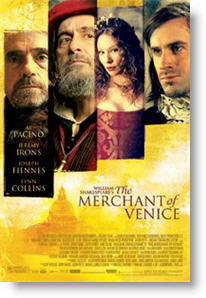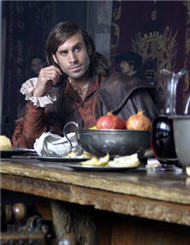William Shakespeare’s The Merchant Of Venice
 for some nudity.
for some nudity.
Reviewed by: Shannon Hammell
CONTRIBUTOR
| Moral Rating: | Offensive |
| Moviemaking Quality: |
|
| Primary Audience: | Adults |
| Genre: | Drama |
| Length: | 2 hr. 18 min. |
| Year of Release: | 2005 |
| USA Release: |
December 29, 2004 |




RACISM—What are the consequences of racial prejudice and false beliefs about the origin of different ethnicities? Answer

How can I deal with temptations? Answer
What are the consequences of sexual immorality? Answer
Nudity—Why are humans supposed to wear clothes?
| Featuring |
|---|
| Al Pacino, Joseph Fiennes, Zuleikha Robinson, Lynn Collins, Charlie Cox |
| Director |
|
Michael Radford |
| Producer |
| Cary Brokaw, Barry Navidi, Michael Cowan |
| Distributor |
William Shakespeare’s writings, to paraphrase one of his contemporaries, are not solely limited to his generation but for all times. One can find a modern romantic comedy on the silver screen or in one of Shakespeare’s plays such as “Much Ado About Nothing,” “A Midsummer Night’s Dream,” or even “Twelfth Night.” Even one of Shakespeare’s controversial plays has a certain, prophetic side. “The Merchant of Venice” explores anti-Semitism in one of the most liberal cities of the Renaissance period. During this time, Jews were segregated into different living quarters or ghettos (as they were known in Italian), and men had to wear red caps distinguishing them from their Christian counterparts. This anti-Jewish prejudice seems all too familiar with what occurred some 50 to 60 years ago.
Antonio (the talented Jeremy Irons) is a rich sea merchant who has a strong dislike toward Jews, especially Shylock (the equally talented Al Pacino), a wealthy man who makes his living as a moneylender or usurer (as Shakespeare calls it). Shylock tries to make an attempt to say “hello” to Antonio in a crowd but is received by being spat in the face. The two men are extremely distant, separated by misconceptions about their spiritual faiths.
While Shylock is doing well for himself, Antonio is having some financial troubles. Business isn’t as usual and when his friend, a nobleman named Bassanio (Joseph Fiennes), comes to ask him for money so he can woo the fair and beautiful Portia (Lynn Collins), he is forced to seek a lender to loan him 3,000 ducats. After all, Antonio could not turn down his best friend, especially if he’s going to court the woman of his dreams. He finally swallows his pride and pays a visit to Shylock’s office, asking him for a loan.
At first, Shylock is hesitant to lend him the money, because of how Antonio had treated him in the past (spat on him, called him a dog, mocked him, etc.), but then decides to grant him the loan because he felt that Antonio was a “good man” and had good credit (second mortgages were unheard of during this time). If Antonio could not pay back the loan within three months’ time, he is to forfeit one pound of his flesh to Shylock. Despite Bassanio’s plea to not accept the “deal,” Antonio complies, saying that he would make much more than twice the amount in the next few months.
Meanwhile, Portia and her best friend Nerissa (Heather Goldenhersh) are hanging out at Portia’s huge estate, awaiting her potential suitors. Portia’s father had set up some sort of “puzzle” to choose her husband. There are three boxes set up: one made of gold, one made of silver, and one made of lead, and the man who selects the box containing Portia’s picture wins her as a bride.
With her picture safely tucked away in the lead container, two anxious suitors arrive only to pick the wrong box (a wealthy moor had selected the gold box containing a skull, while an old, rich aristocrat had selected the silver one, containing a replica of a fool’s head). Now, it’s Bassanio’s turn, as he shows up decked out in fine, expensive clothing and an entourage following him wherever he goes. Thanks to Antonio’s loan, he is able to woo his beloved Portia (and by selecting the right box).
Things are not going well for Antonio when he loses profit on some of his cargo on one of his ships (it sank). It has been three months, and Shylock is immediately on his case about the 3,000 ducats. Antonio tries to explain, saying the situation was beyond his control, but Shylock is unmoved; he demands “revenge” by getting the pound of Antonio’s flesh.
After the weddings of Portia to Bassanio and Nerissa to Bassanio’s friend, Gratiano (Kris Marshall), the newlywed grooms must leave on business, all while news of Antonio’s situation reaches Portia’s home.
Realizing that Antonio is a good Christian friend to her husband, Portia devises a plan to get even with Shylock, who is still bitter about the unpaid loan and the fact that his daughter, Jessica, ran away from home, converting to Christianity to marry a wealthy young nobleman.
Objectionable content
“The Merchant of Venice” contains some sexual nudity, although there are no sex scenes, women bare their breasts on a few occasions, in eight shots, at wild parties (much like the opening scene of “Dangerous Beauty”). Some “humorous” sexual innuendoes are shared among friends. It’s implied that “good Christian” Jessica partakes in these hedonistic, raunchy parties, spending money that she stole from her father, Shylock (this is only seen in one shot, nothing graphic). It’s implied that Portia, Bassanio, Nerissa, and Gratiano “go to bed” after Portia and Nerissa had played a “practical” joke on them. In respect, Bassanio slightly kisses Antonio on the lips as a sign of respect (some might be offended by this). Two women are seen dressed as male lawyers trying to defend Antonio in court (some also may be offended by this). Nerissa pulls out a ring hiding in her cleavage.
There are also two acts of violence: a Jewish man is thrown from a bridge into a water canal and a goat is slaughtered (nothing graphic, though). The content itself just barely crosses the line between an R and a PG-13 rating. If the movie was offered through a filtering service, it would easily be a PG or PG-13. While it was not uncommon for women to expose their cleavage at wild parties, it is not acceptable (read 1 Corinthians 12:23 for more information on modesty).
There is almost no Christian content in the film. Priests are seen preaching to the masses about the Christian faith. Their message is clearly directed at the Venetian Jews, however, they are portrayed in a slightly negative manner: they barely even flinch when people throw a Jew over a bridge and into one of the Venetian canals. “Christians” are seen partaking in sexual parties, especially Jessica, the “convert.” Antonio, although having contempt for Shylock at first, is merciful to him by allowing him to keep half his property that was forfeited to Antonio by the state, but wants him to renounce his Judaism for Christianity.
As a Christian, I found this to be offensive. Christians were portrayed as anti-Semites, distrusting of Jews by the stereotype that all Jewish people are money-hungry and usurers, not to mention some of the anti-Semitic content (though it wasn’t played out to intentionally poke fun of Jews). Shylock’s unforgiving attitude toward Antonio is concerning. Even after he was offered TWICE the money he lent, he still wanted a pound of Antonio’s flesh.
Overall, the film was well made, and the costumes and cinematography were excellent. There were a couple of scenes where Al Pacino overdid his character of Shylock, but everything else was superb, including the background music. British actor Jeremy Irons seemed quite natural portraying Shakespeare. Al Pacino had done theater work prior to acting on the silver screen, and watching the film was like seeing Pacino in theater. He is perfect as the money-lending Shylock. The scenery and the shooting locations are realistic for the time period, unlike certain film adaptations of Shakespeare’s films which take place in different eras (i.e. Kenneth Branagh’s “Hamlet” or Baz Luhrman’s “Romeo and Juliet”).
One thing that interested me in this movie was the “prophetic” content. I had previously read the play and wrote two essays on it back in my freshman year of college (as well as a paper on anti-Semitism in Europe), so I am very familiar with the story. The historical backdrop of “The Merchant of Venice” in regards to Jewish history seems all too familiar. Venetian Jews are seen wearing red caps to “distinguish” themselves from their Gentile counterparts and they were segregated in ghettos. In the late 1930s and the early 40s, Jews would still be segregated in ghettos, but instead of wearing red caps, they would be wearing gold stars on their arm sleeves with the German word “Juden” written on them. Prejudice against Jews during the Renaissance was “religious anti-Semitism; prejudice during the Holocaust was “racial anti-Semitism”). As Christians, we should condemn any kind of anti-Jewish sentiment. After all, Christ is a Jew, and Jews are just as human as Christians.
Hath not a Jew eyes? hath not a Jew hands, organs, dimensions, senses, affections, passions? fed with the same food, hurt with the same weapons, subject to the same diseases, healed by the same means, warmed and cooled by the same winter and summer, as a Christian is? If you prick us, do we not bleed? if you tickle us, do we not laugh? if you poison us, do we not die? and if you wrong us, shall we not revenge? If we are like you in the rest, we will resemble you in that.
Even though most Jews don’t accept Christ as the Messiah, we are closely related to them through the Old Testament. “Conversion” by force (as seen in the film) never reaches people for Christ. To paraphrase my pastor, no one comes to the saving knowledge of Jesus Christ through force. When a Jew accepts Christ, he or she is sometimes known as Messianic Jew (depending on whether or not they still keep the old Jewish customs), knowing Christ by the name, Yeshua.
Still, the negative Christian content does not permeate the movie, unlike Ridley Scott’s “Kingdom of Heaven.”
Despite the R-rating, it can be appropriate for mature teenagers (the film should’ve had its sexual content toned down in the first place, so it could have received a PG-13). Aside from the objectionable content, Christian Shakespeare fans will not be disappointed in this fine production. If put through a “filter,” it would still make a great movie. However, it is wise to read the play first before renting the film version.
Violence: Minor / Profanity: Minor / Sex/nudity: Moderate
See list of Relevant Issues—questions-and-answers.


However, it is important when talking about any Shakespeare film to first acknowledge just what a devout and profoundly insightful Christian William Shakespeare himself was. Shakespeare’s plays, while depicting the greatest evils that exist in our world, are always entirely pure and wholesome in their entirety. The Bible too depicts great violence and evil, but it does so to exhort us from such wickedness and demonstrate the destructive nature of sin and our need as human beings for grace.
And that is what “The Merchant of Venice” is really all about. The entire play centers on this idea of our guilt of sin and the fact that we are all in desperate need of grace and forgiveness. In this play, we have Antonio, a man who (like all of us) has fallen short and made a mistake and found himself before a court of law, with the infamous moneylender Shylock demanding Antonio be made to forfeit his life for failing to pay an unpayable debt as the letter of the law demands.See all »
Moral rating: Excellent! / Moviemaking quality: 5

The superstitious and evil anti-Semitic practices of the place and era are shown as well as Antonio’s part in the conspiracy to whisk away Shylock’s daughter and stolen property. This background information gave a realistic build up to Shylock’s agitated mental state and makes the audience understand when he later goes after his just and rightful pound of flesh with such vengeance. Al Pacino steals the show with his wonderful performance. When I first read the play in High School I thought the character cared more for his money than his daughter—but this performance by Pacino gives a much more believable view of the character’s relationship with his daughter, Jessica.See all »
My Ratings: Excellent! / 5